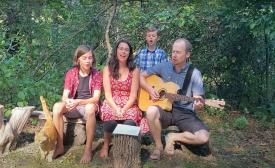Volume 24, Number 19
Substance over glitz

Jon Lebold seals a Mennonite Central Committee relief kit with the help of his son, Jed Lebold. 'Mennonite agencies like MCC and others have found ways to serve people in critical need for a century,' Tobi Thiessen writes. 'They do it with little glitz but a lot of substance.' (Photo courtesy of Facebook.com/MCCpeace)
While public conversation swirled in July over the details of WE Charity’s speaker fees and all-expenses-paid trips for donors, my church was having a sermon series on Mennonite Central Committee’s 100 years of service in the name Christ.
Selling generosity
When I am asked what I do for a living, I often say, “I show people how much fun it is to give their money away.” That elicits a better conversation than if I tell them I manage a registered, charitable, donor-advised foundation.
Readers write: September 14, 2020 issue
It’s been a feast!
“Find us empty and wandering . . . find us in the wilderness, and fill us with your feast.”
This lyric by Phil Campbell-Enns, pastor of Home Street Mennonite Church in Winnipeg, is from a song that was chosen for the first Mennonite Church Canada online worship service on March 22. At the time, it perfectly described where we found ourselves and how we felt.
CMBC student discussion
In Saskatoon, at the 1975 Conference of Mennonites in Canada annual conference, the Canadian Mennonite Bible College (CMBC) board, “long embarrassed about faculty salaries,” asked for funds to raise salaries to a maximum of $20,000 per year for PhD professors after 10 years of service.
Bethel moments
A story in Genesis 28 describes the patriarch Jacob stopping for the night while on a journey. His sleep includes a dream of a visit from God. In the morning, Jacob awakes and offers the profound observation, “Surely the Lord is in this place, and I didn’t know it! This is none other than the house of God!”
As a result of that experience, Jacob names the spot “Bethel.”
Learning from Quakers
Because of my Christian friends I’m taking a hiatus from social media. One has repeatedly posted a meme of Jesus with an AK-47 assault rifle. I tried hard to explain in detail why I thought this was horrible. What I mean, of course, is that we argued.
A spiritual disruption
White Mennonite static
The Mennonite church has the opportunity to become a dependable partner in the work of dismantling racism.
The church as a whole has a record of racism—both overt and covert—that has been attested to by generations of Black, Indigenous and people of colour (BIPOC) community members both within and outside the church.
Canadian voices on racism
What follows is a companion piece to "White Mennonite static" by American scholar Tobin Miller Shearer.
To read
Fair-trade store emulates Ten Thousand Villages
The Ten Thousand Villages (TTV) store in Vancouver has closed, but the idea of fair-trade products continues to inspire a new generation to shop both ethically and globally. Kasandy/Locally Global occupies the space that TTV formerly had on Granville Island.
Defeating Goliath
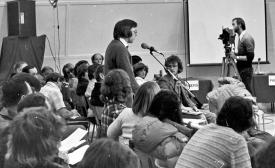
Ernie Hildebrand, standing at the microphone, speaks at the FEARO hearings regarding a proposed uranium refinery in the Warman, Sask., area, in 1980. (Photo courtesy of Jake Buhler)
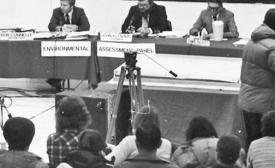
More than 200 community members, many of whom were Mennonite, testified at the FEARO hearings regarding a proposed uranium refinery in the Warman, Sask., area, in 1980. (Photo courtesy of Jake Buhler)
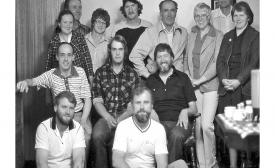
Members of the Warman and District Concerned Citizens Group gather for a group photo. Pictured from left to right, front row: Wilfred Buhler and Jake Buhler; second row: Emille Van Pinxteren, Garry Boldt, and Edgar Epp, who was the organization’s second chair; and back row: Louise Buhler, Sam Rempel, Gertie Rempel, Leonard Doell, Peter Froese, Jeanie Van Pinxteren, Lyle Stucky and Ruth Buhler. Missing from the photo are Nettie Wiebe and Ernie Hildebrand. (Photo courtesy of Jake Buhler)
It’s been 40 years since David battled Goliath on the plains of Saskatchewan. David, in this case, was a group of ordinary citizens, many of whom were Mennonite, and Goliath was the nuclear industry.
MCC connects with supporters through digital media
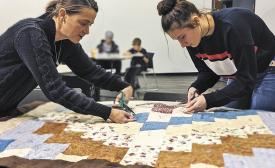
Nadine Ens and her daughter Jenice tie knots in a comforter at the Great Winter Warm-up in Saskatoon on Jan. 18, to kick off MCC’s centennial. MCC is using a webinar series and new podcasts to share stories about its work in Canada and around the world. (MCC photo by Myriam Ullah)
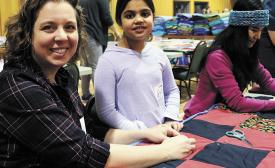
Corinne Narine, left, her daughter Jaden Narine, and Ting Terrazas, all of Winnipeg, are tying their first comforter of the day at the Great Winter Warm-up, a comforter-tying event that was held across Canada, the United States and Europe to kick off MCC’s centennial on Jan. 18. In total, MCC received 9,504 comforters, exceeding the goal of 6,500. (MCC photo by Emily-Ann Doerksen)
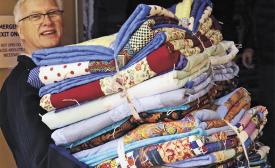
Volunteer Gord Friesen helps load 210 completed comforters into a truck at the end of the Great Winter Warm-up event at North Kildonan Mennonite Brethren Church in Winnipeg, on Jan 18. An MCC webinar episode, called ‘From hearts to hands: Material resources,’ describes meaningful volunteer opportunities for people to make and pack comforters and relief kits. (MCC photo by Emily-Ann Doerksen)
“One bar of soap isn’t just a drop in the ocean of need. The ripples keep moving out in ways we may not even be able to count.”
‘It’s a bit overwhelming’

Carol McNaughton hikes the Wasootch Ridge as a participant in the 2020 Camp Valaqua hike-a-thon fundraiser. (Photo by Hossein Talebi)

Lethbridge Mennonite Church and Springridge Mennonite Church in Pincher Creek, Alta., join forces to raise money for this year’s Camp Valaqua hike-a-thon. (Photo by Elaine Klassen)
Camp Valaqua received great news recently. As of Aug. 26, its annual hike-a-thon raised a record amount of $34,456, nearly double the previous record of $18,000.
Ron Janzen, who is often the biggest fundraiser, beat his own record, raising more than $10,000 this year.
Why was so much raised in 2020?
Steady giving sustains churches through COVID-19
Among the multitude of concerns COVID-19 has caused, the novel coronavirus’s effect on congregational giving has been one of them. What do church finances look like when congregations close their doors and stop passing offering baskets through the aisles on Sunday mornings? It turns out that in many Mennonite congregations across Manitoba, they look just fine.





